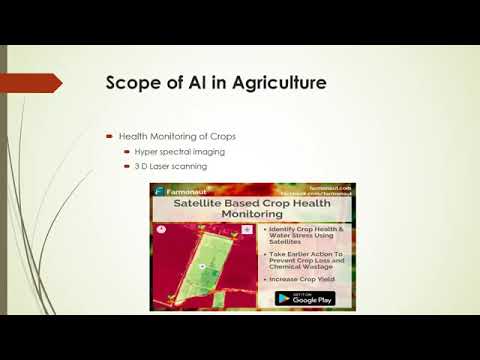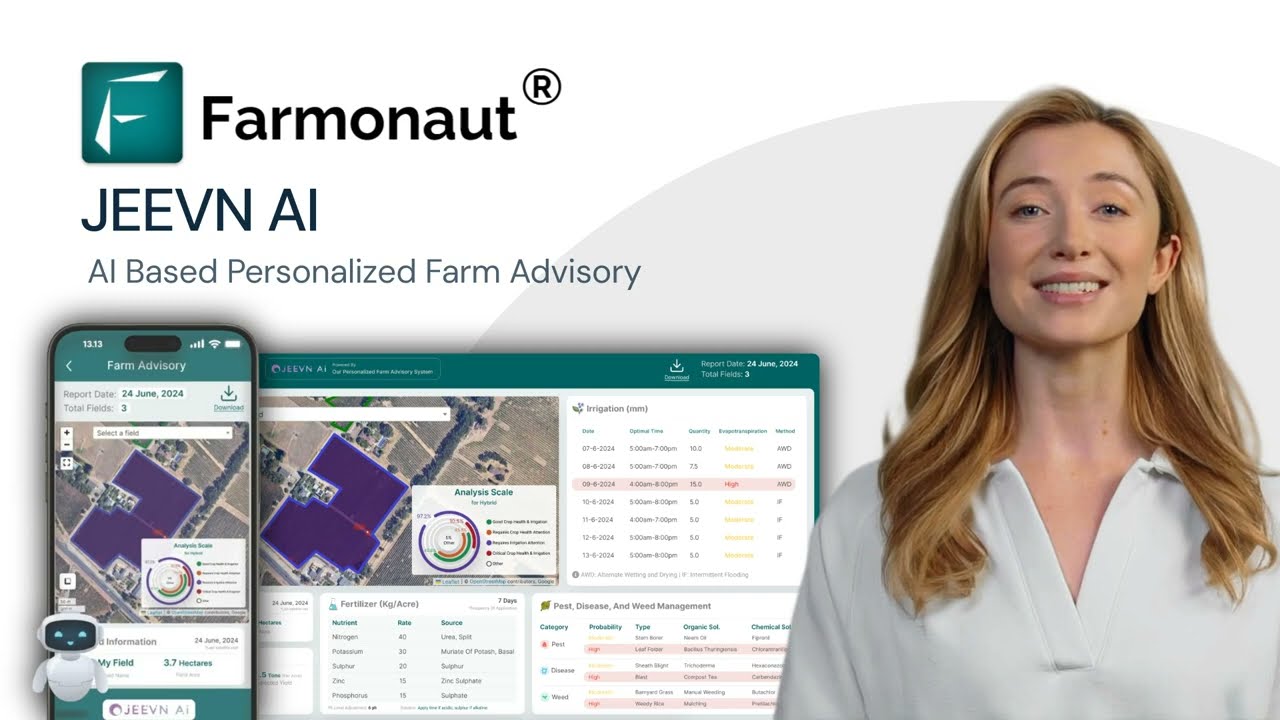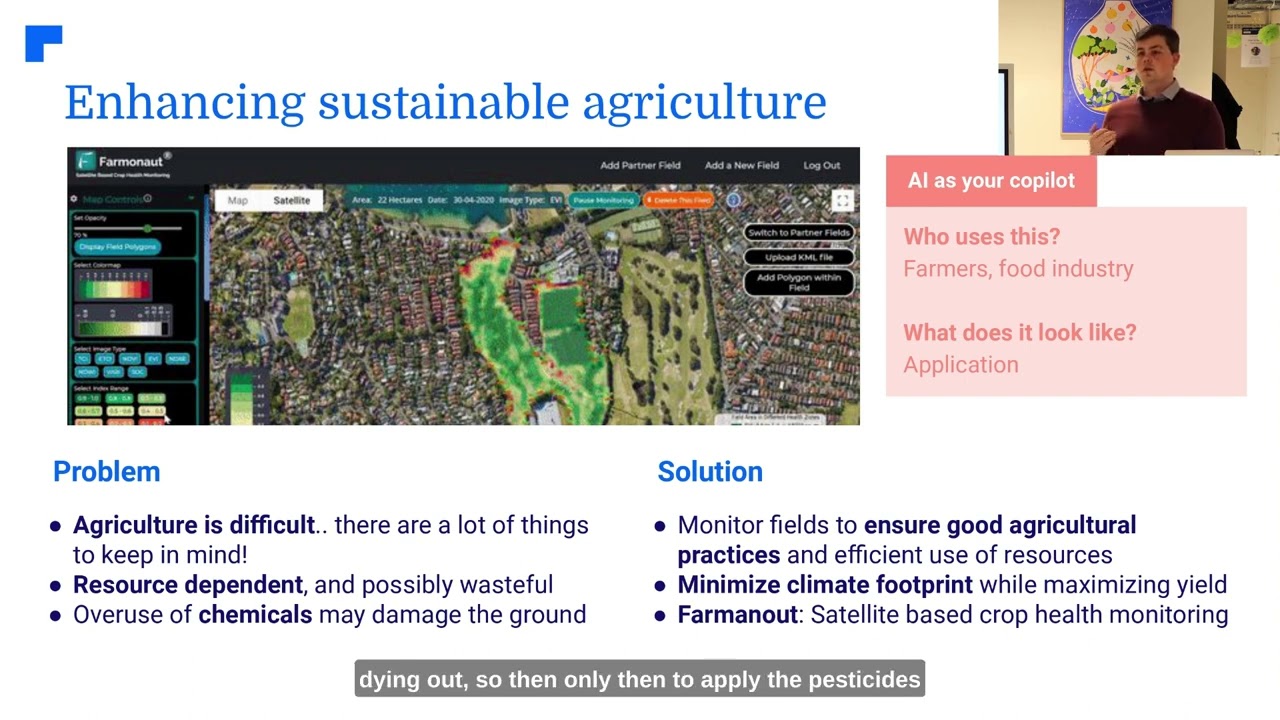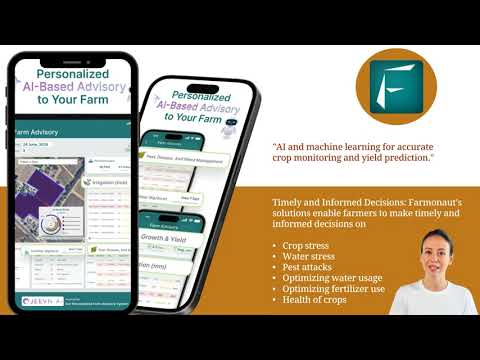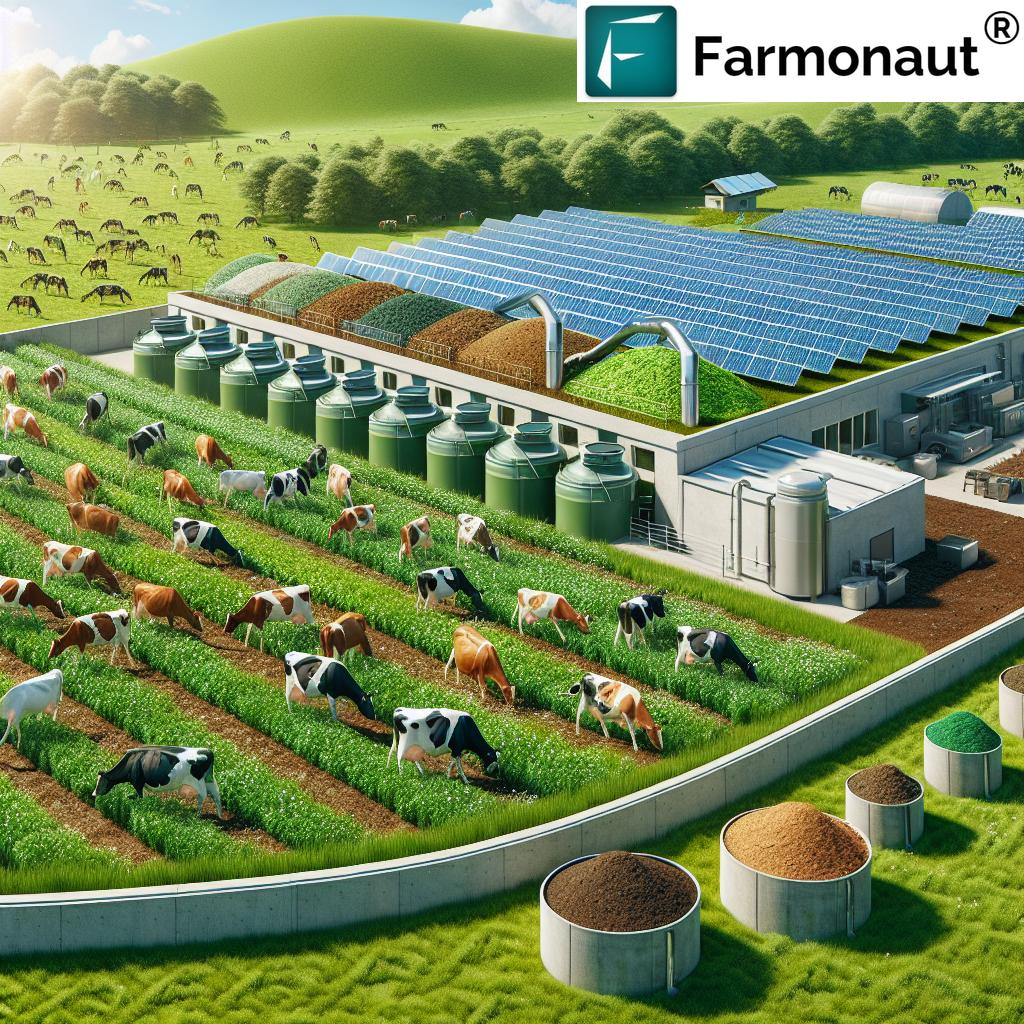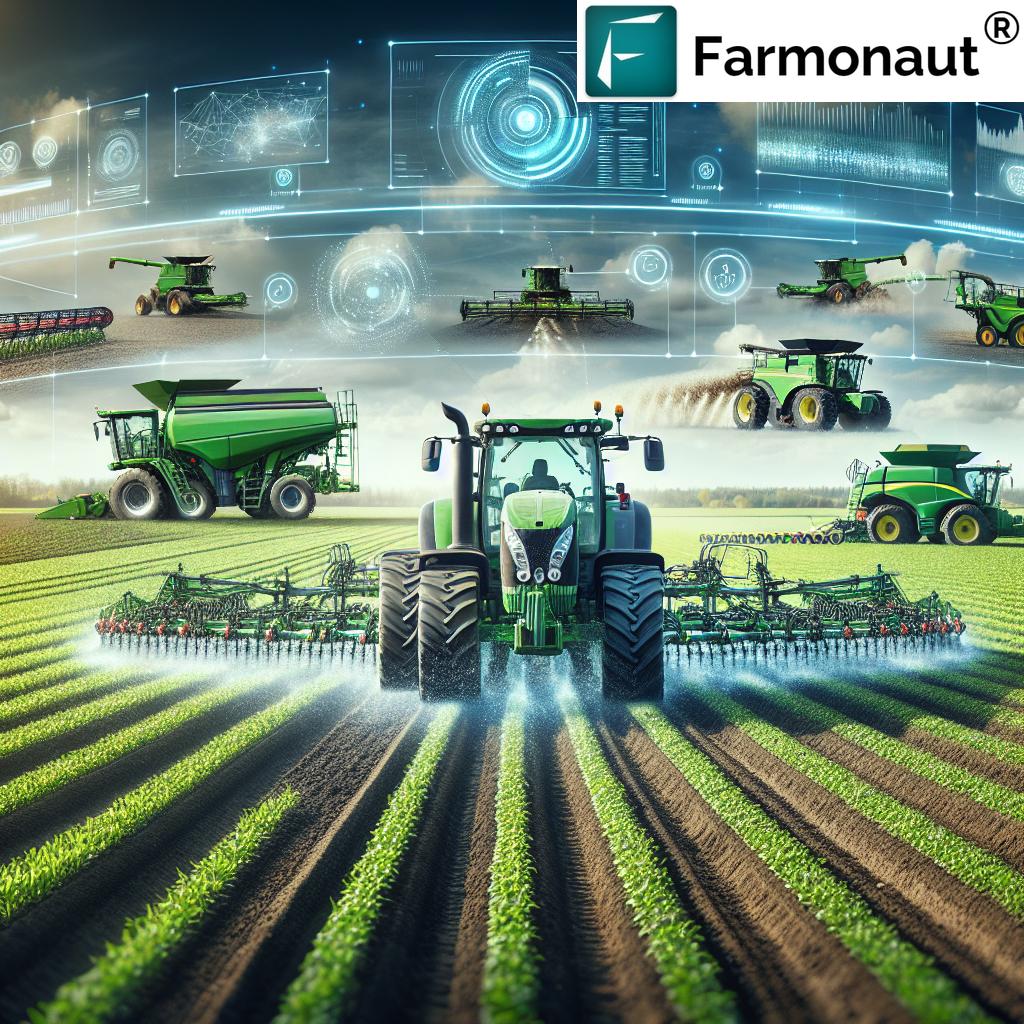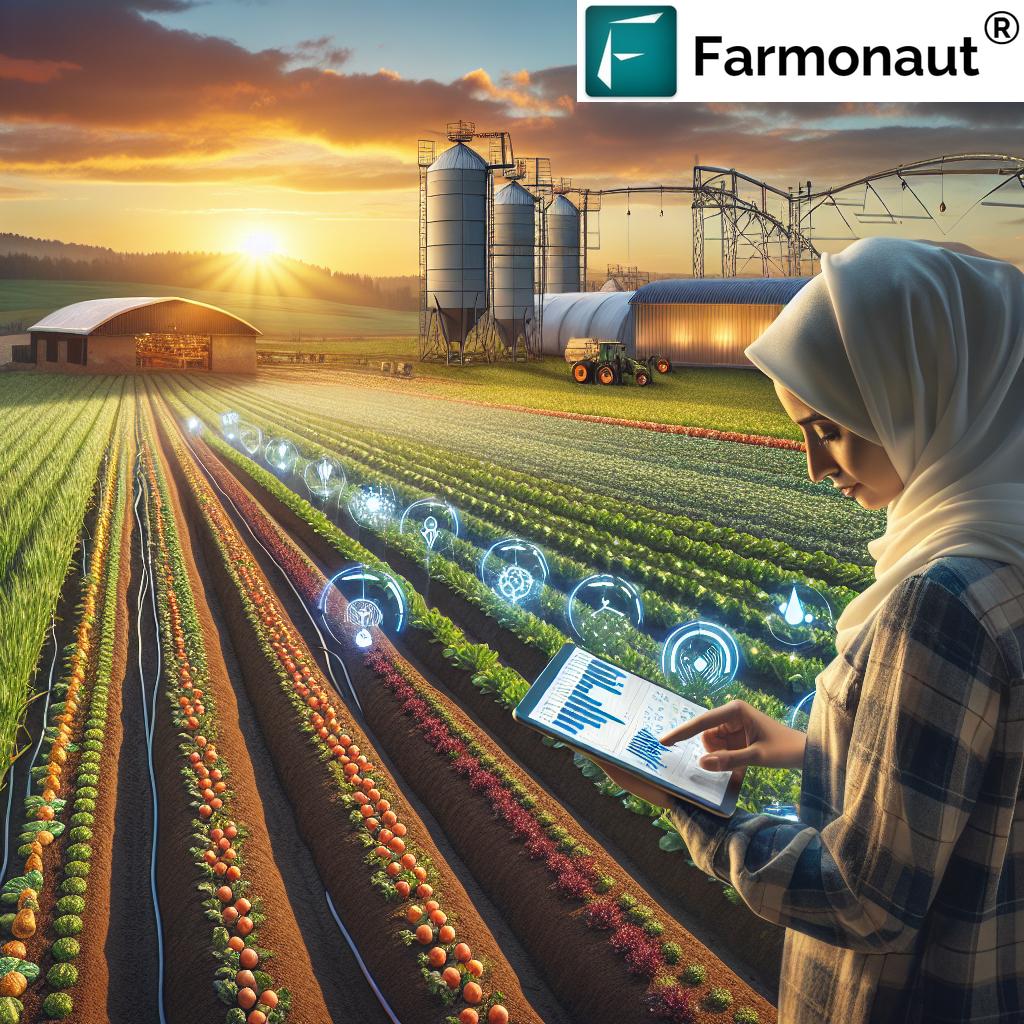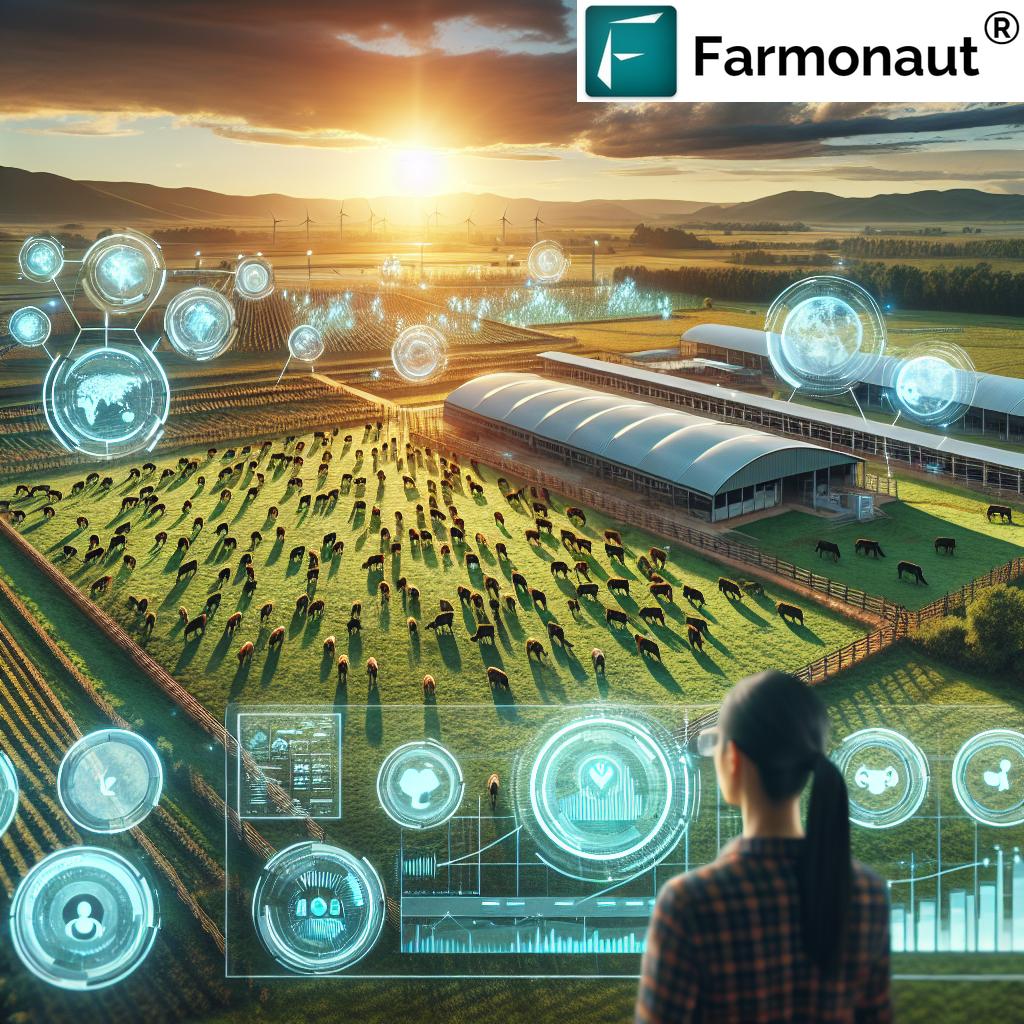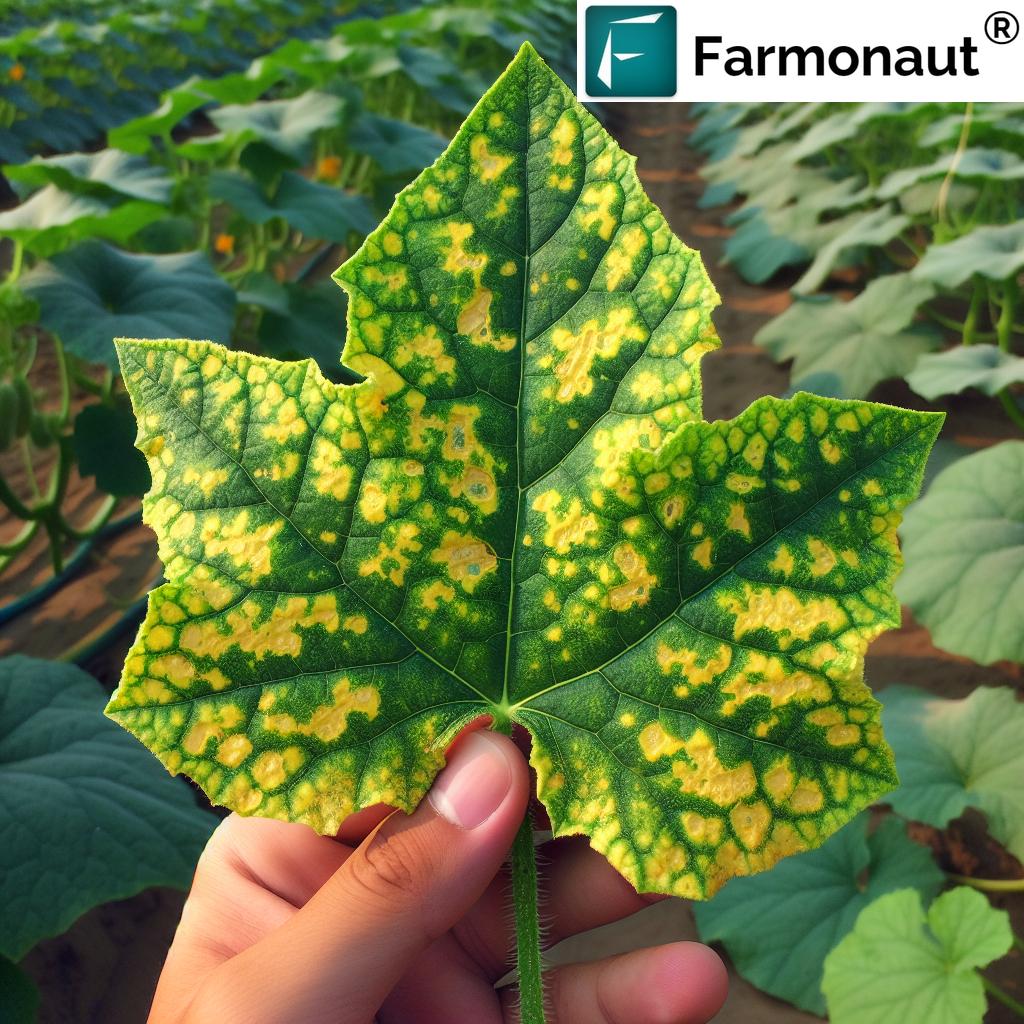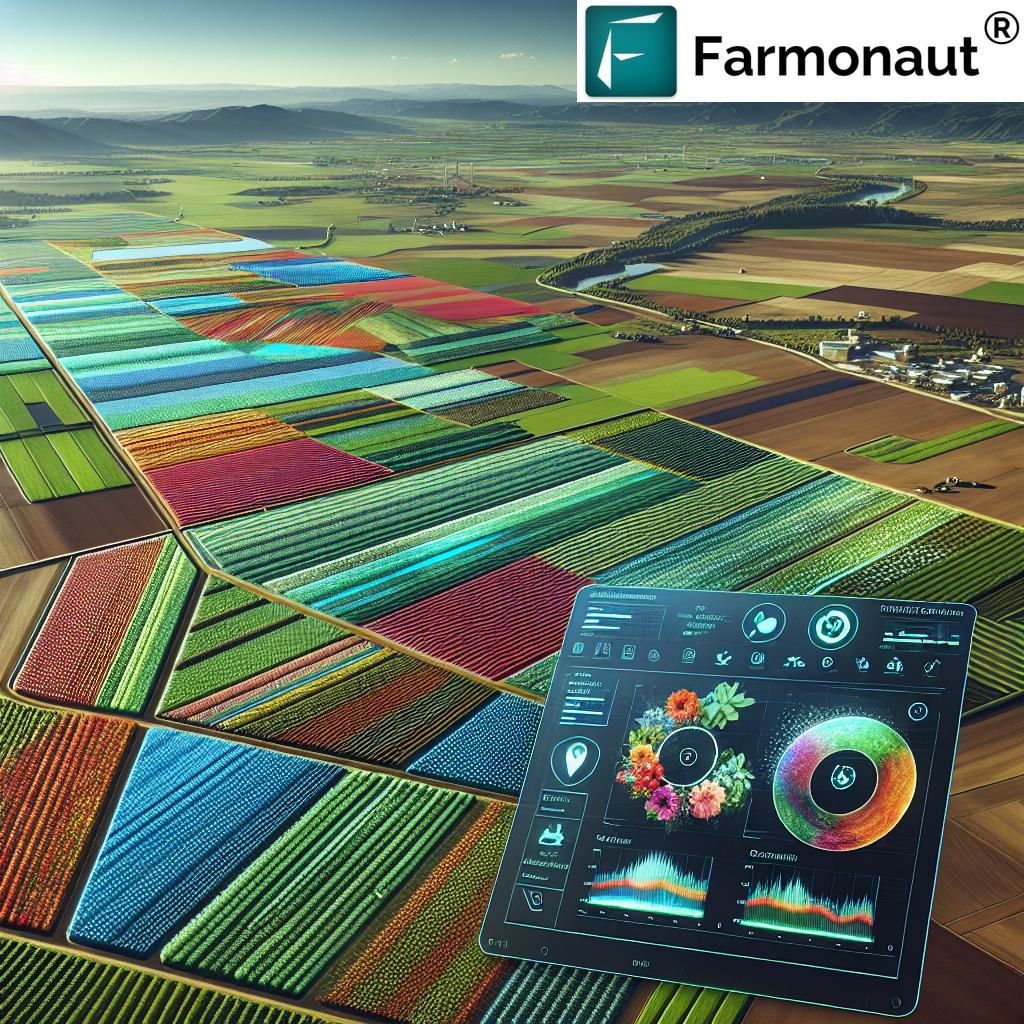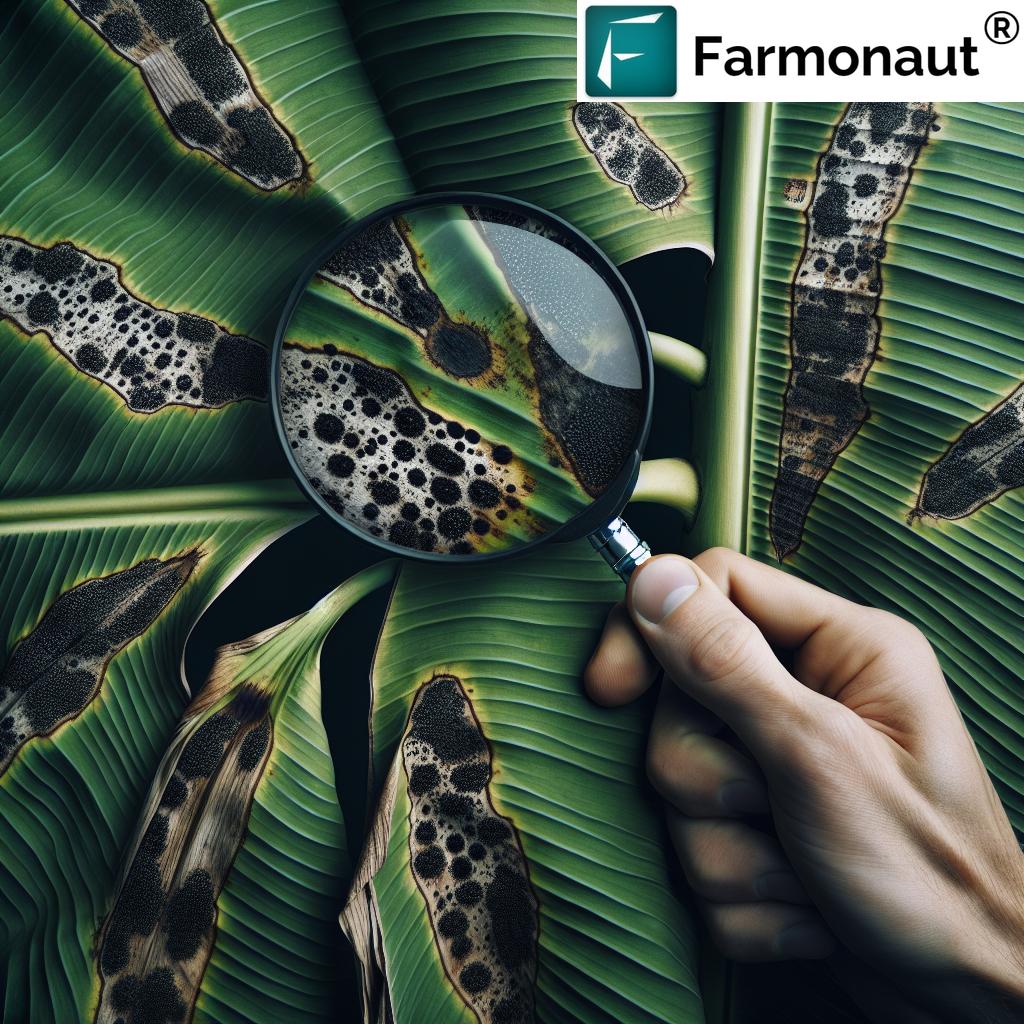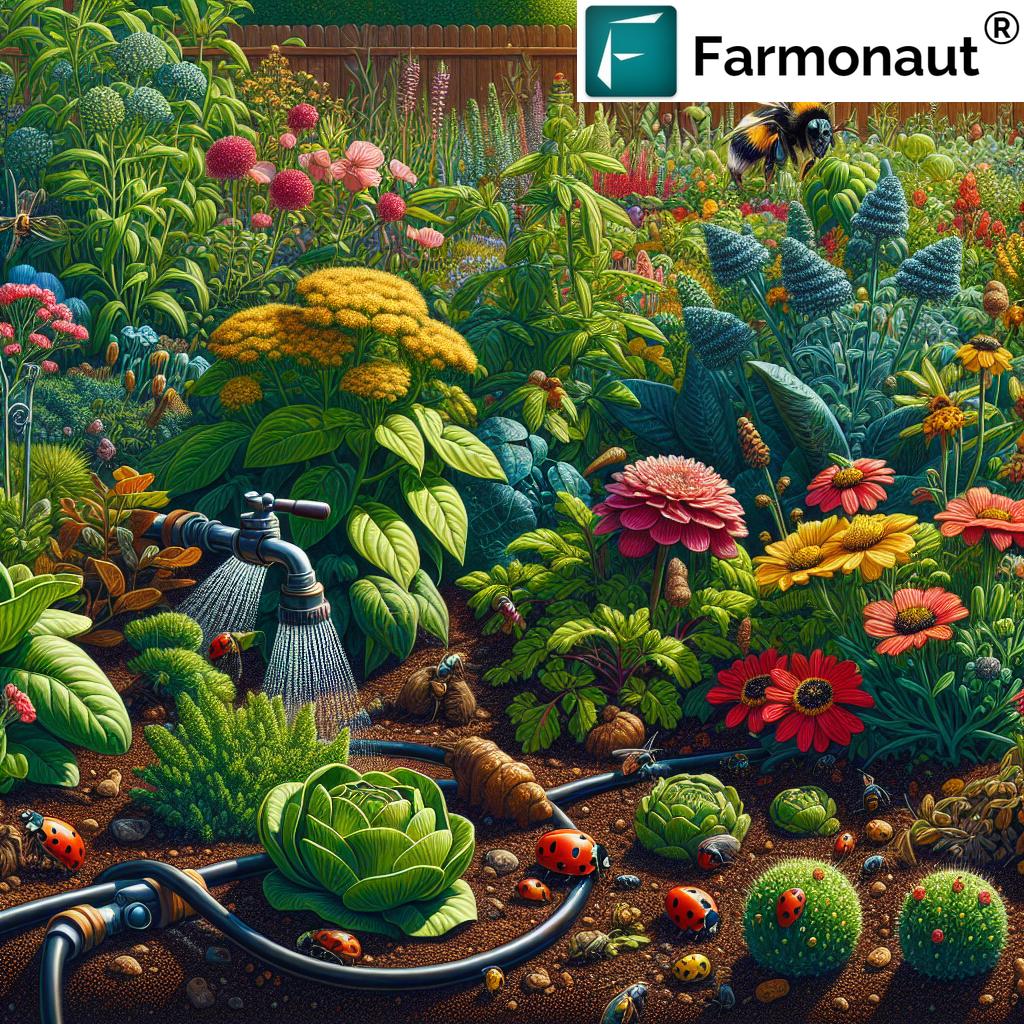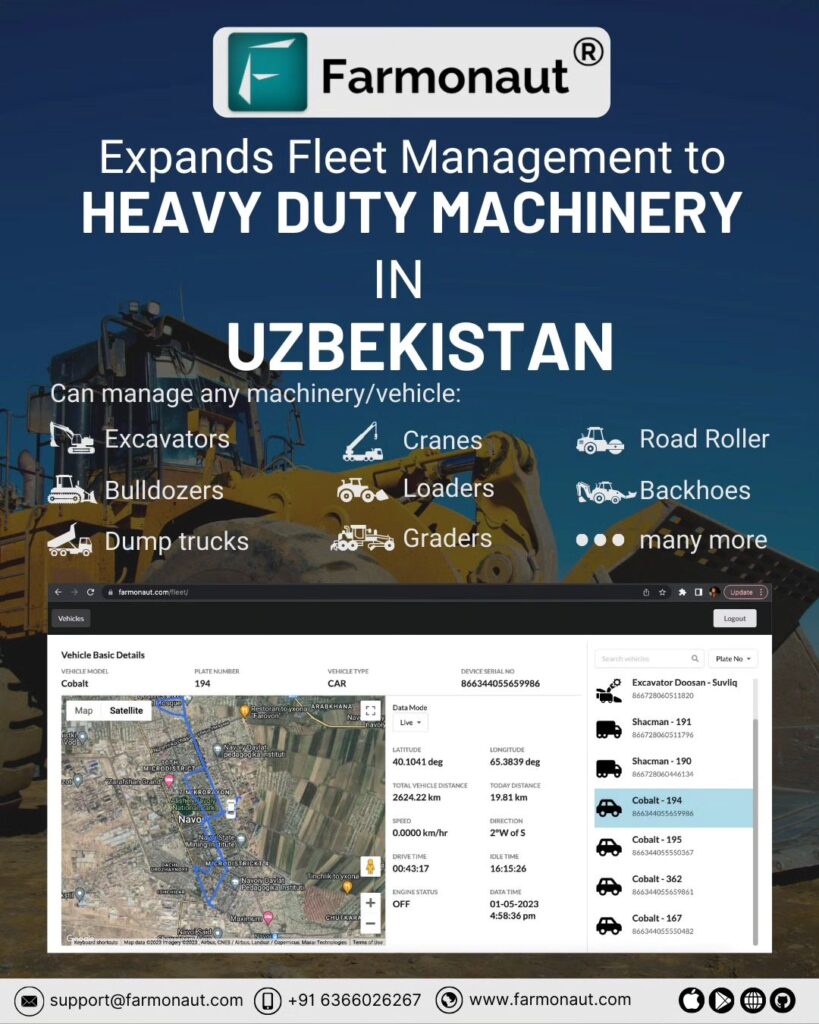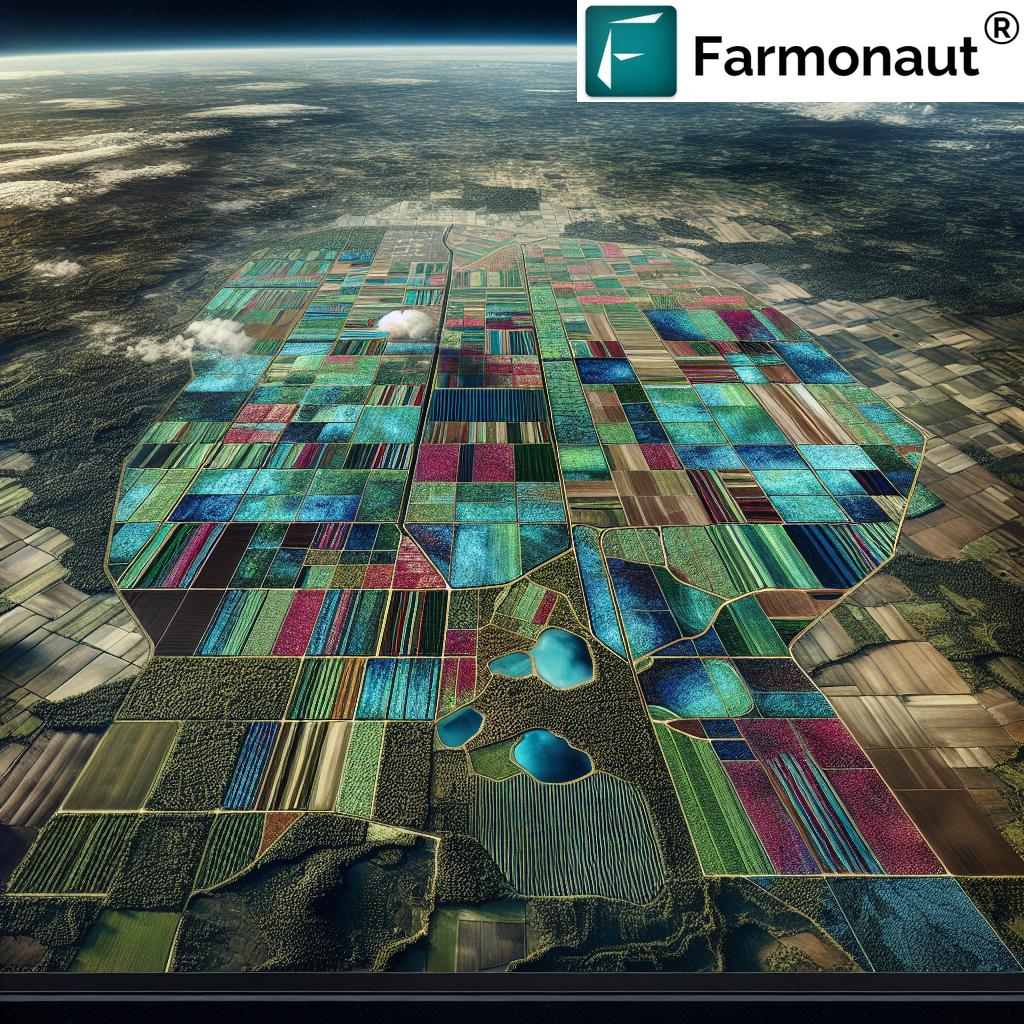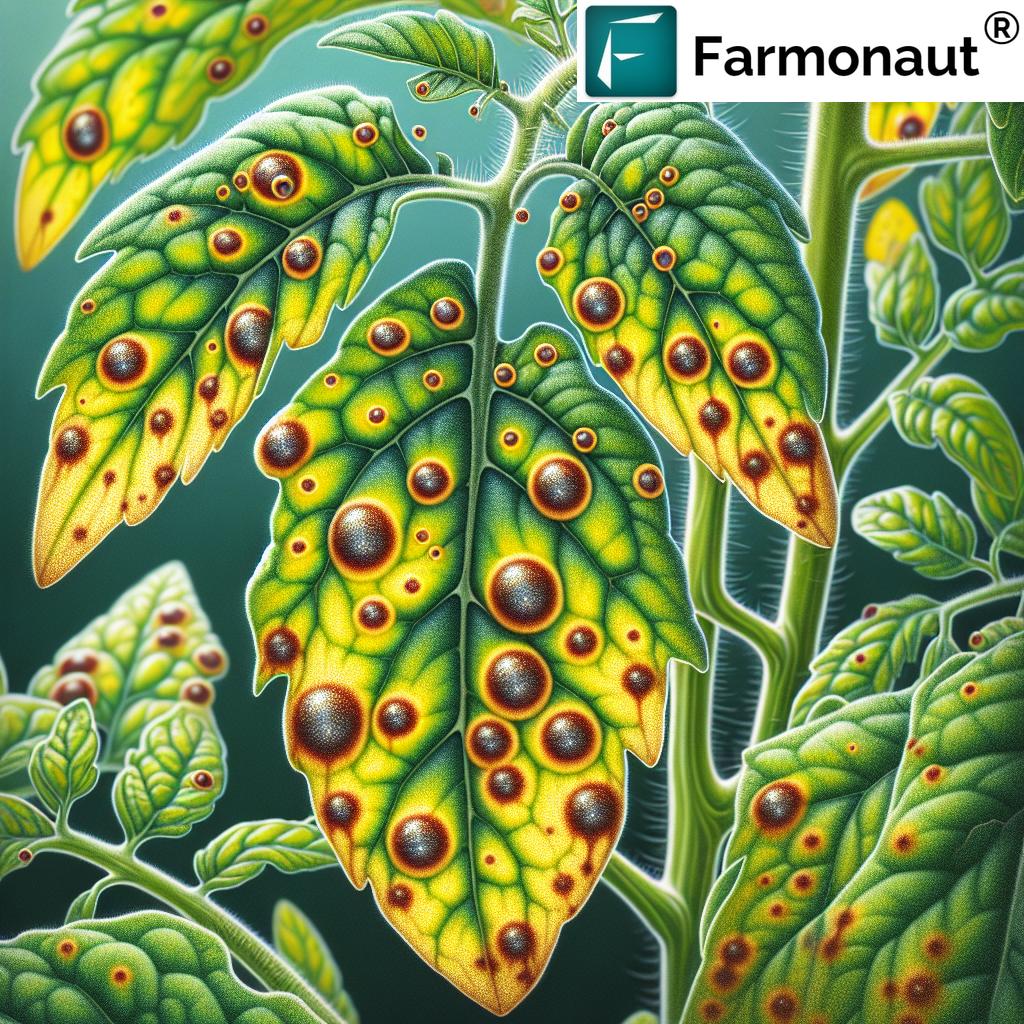AI-Powered Agricultural Insights: Boost Crop Yields Now
“AI-driven precision farming can increase crop yields by up to 30% through smarter resource allocation and disease prediction.”
- Introduction: The Agricultural Transformation with AI
- Precision Farming and Crop Management
- Predictive Analytics and Risk Management
- Automated Farming Operations
- Resource Efficiency and Sustainability
- Early Pest and Disease Detection
- Livestock Monitoring and Health Management
- Supply Chain Optimization with AI in Agriculture
- Climate Resilient Agriculture and Sustainability
- Comparative Benefits Table: AI Applications vs. Traditional Methods
- Farmonaut AI-Powered Precision Solutions
- Economic and Environmental Impact of AI in Agriculture
- Challenges & Considerations for Adopting AI in Farming
- Frequently Asked Questions about AI in Agriculture
- Conclusion
Introduction: The Agricultural Transformation with AI
The intersection of artificial intelligence (AI) and agriculture is rapidly reshaping how we approach farming, resource management, and environmental stewardship. AI-powered agricultural insights are not just the future—they are essential tools for today’s farmers, helping us boost crop yields, enhance efficiency, and ensure sustainability in every step from planting to harvesting.
By leveraging a combination of data from drones, IoT sensors, weather stations, and satellites, AI technologies empower farmers to optimize crop health, reduce input costs, and provide proactive decision-making capabilities. According to zipdo.co, AI-driven precision agriculture solutions can increase crop yields by up to 15%, and even 30% in some cases, by enabling precise resource allocation and timely disease detection.
This comprehensive guide explores how AI is revolutionizing agriculture, focusing on how precision farming solutions, predictive analytics, smart resource management, and advanced technologies shape sustainable, profitable modern farming.
Precision Farming and Crop Management: AI-Powered Insights for Maximizing Yields
At the heart of modern farming lies precision agriculture. AI in agriculture utilizes machine learning models to analyze vast datasets acquired from drones, IoT sensors, satellites, and ground stations. These systems provide real-time crop health monitoring, continuously analyzing data on soil moisture, nutrient levels, and weather patterns.
- IoT and Soil Sensors: These devices constantly monitor soil moisture, nutrient content, and temperature, providing data to optimize irrigation and fertilization schedules.
- Satellite Imagery: High-resolution satellites deliver multispectral images, enabling disease detection, vegetation health analysis, and yield estimation at a granular level.
- Drones: Equipped with cameras and sensors, drones fly over fields to identify crop stress, pest outbreaks, and variations in plant growth.
By synthesizing these data streams, AI-driven systems optimize every stage—from precise planting and irrigation planning to fertilization and harvest timing. The result: increased crop yields, improved quality, and reduced resource waste.
- Example: AI-enabled smart irrigation systems apply water precisely where, when, and in the amount needed—minimizing wastage and maximizing growth.
- Farmers using these precision farming solutions can boost output by up to 30% while reducing water and fertilizer use.
For those seeking affordable and accessible precision farming, we at Farmonaut provide real-time satellite-based crop health monitoring, helping farmers monitor vegetation health, soil moisture, and manage inputs with accurate, timely insights directly via web, Android, or iOS. This approach helps optimize yields and reduce costs without expensive hardware.
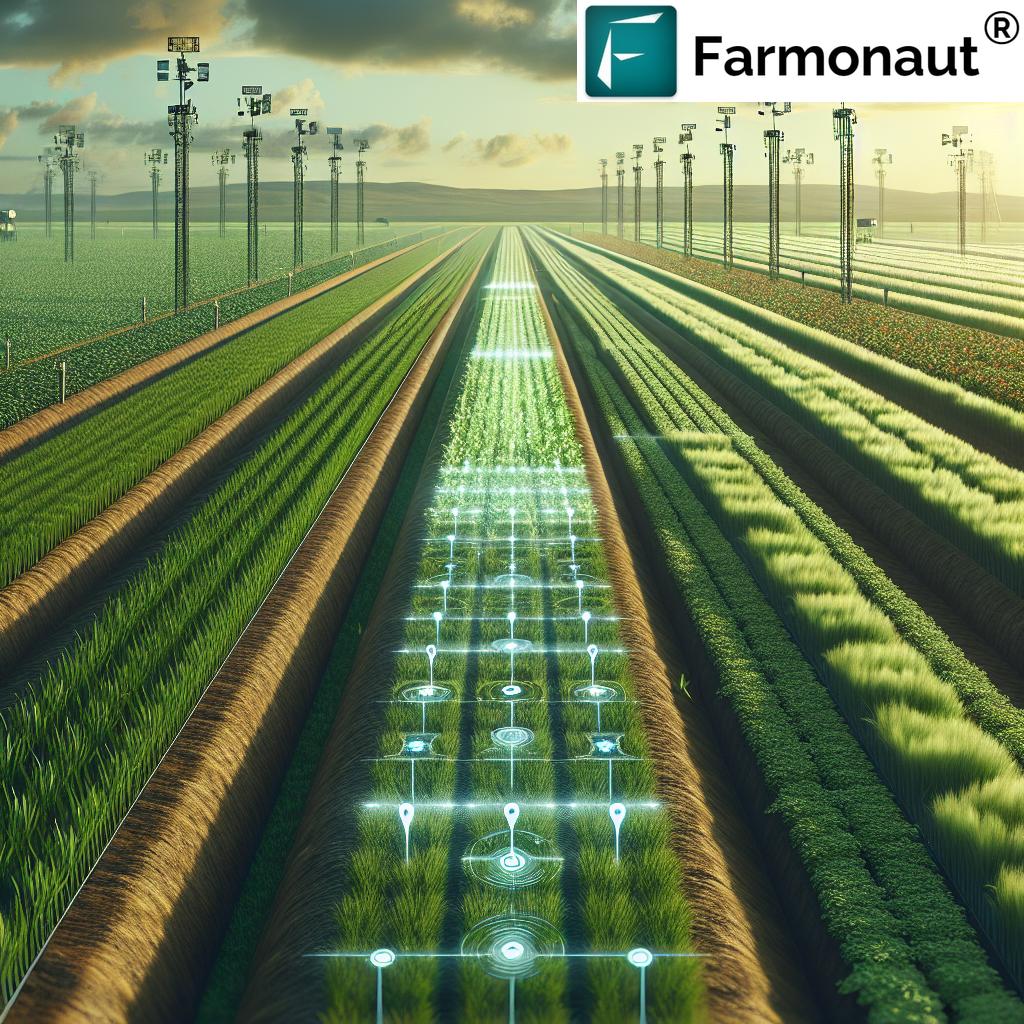
Predictive Analytics and Risk Management: Smarter Farm Planning
Predictive analytics for farmers harnesses AI to process historical and current datasets and forecast crucial factors:
- Weather Forecasting: Accurate weather predictions support better planning for planting, irrigation, and harvesting, minimizing risks of yield loss.
- Pest and Disease Outbreaks: AI models identify early warning signs by analyzing data trends, alerting farmers to take proactive measures and apply targeted treatments.
- Market Demand and Price Fluctuations: By analyzing market data, AI systems help farms align production schedules with high-demand windows, improving profitability.
- Yield Prediction: Data-driven models estimate crop output, aiding in resource allocation and harvest logistics.
AI-driven predictive analytics for farmers can improve forecasting accuracy by up to 40% (zipdo.co), helping farmers optimize input use and reduce risks of losses or missed market opportunities.
With our Jeevn AI Advisory System, Farmonaut offers personalized, real-time farm management advice. Combining satellite imagery with weather forecasts, Jeevn AI helps optimize planting schedules, improve risk mitigation, and enable smart, informed decisions—critical for sustainable agriculture.
Automated Farming Operations: Reducing Labor, Increasing Productivity
Automated farming operations leverage smart machinery—from autonomous tractors to robotic harvesters and drones—to efficiently handle tasks such as:
- Planting: Automated planters use AI to ensure seeds are sown at optimal depths and spacing.
- Spraying: Drones equipped with AI-driven sensors deliver precise amounts of fertilizers and pesticides, reducing waste.
- Harvest Forecasting & Scheduling: AI algorithms analyze crop readiness and weather conditions to determine the ideal time and method for harvesting, minimizing waste and maximizing value.
By automating repetitive and labor-intensive tasks, farms reduce dependency on manual labor, lower costs, and experience increased operational efficiency—particularly valuable for large farms and agribusinesses.
Autonomous tools also free up valuable human resources for strategic decision-making and enable faster scaling of operations (zipdo.co).
Our Farmonaut Fleet and Resource Management tools empower agribusinesses to track and optimize agricultural machinery, reduce fuel and maintenance costs, and enhance overall fleet management for improved profitability and sustainability.
“Over 60% of farmers using AI-powered insights report improved crop health and reduced resource waste in their operations.”
Resource Efficiency and Agricultural Sustainability Practices
Sustainability is central to both modern resource management and the global fight against environmental degradation. AI-powered smart irrigation systems, fertilizer management tools, and pest control systems collectively ensure efficient input use, resulting in:
- Reduced Water Wastage: AI algorithms calculate optimal times for irrigation, considering weather forecasts and real-time soil data. This can reduce water usage by up to 50%.
- Targeted Fertilizer Application: Data-driven insights enable applying fertilizers only where needed—minimizing environmental impact and cutting costs.
- Less Pesticide Use: Early pest detection and targeted spraying prevent blanket applications, thus safeguarding ecosystems while maintaining crop health.
According to industry estimates, AI applications in agriculture are expected to save farmers around $20 billion annually by 2025, emphasizing the enormous economic value of adopting these technologies (zipdo.co).
We at Farmonaut also offer carbon footprinting tools that track emissions in real-time, helping businesses actively reduce their environmental impact and comply with international sustainability standards.

Early Pest and Disease Detection: Protecting Crops and the Environment
AI-powered image recognition and machine learning advance early pest and disease detection in agriculture. With high-resolution images from satellites, drones, and field cameras, models can:
- Spot stress signals in crop leaves that indicate early pest infestations or diseases.
- Alert farmers to act before problems escalate, enabling targeted treatment and reducing unnecessary pesticide application.
- Help develop prevention strategies using historical patterns to anticipate outbreaks.
This technology has a significant environmental impact, cutting average pesticide use by 30% and promoting healthier, more biodiverse farming systems (zipdo.co).
Through our satellite-based disease detection capabilities, Farmonaut empowers farmers to quickly identify at-risk crop zones and implement swift, cost-effective treatment—dramatically reducing potential losses.
Livestock Monitoring and Health Management: Smarter Animal Welfare
Livestock farming also benefits immensely from AI:
- Wearable Sensors: Attached to animals, these devices monitor behavior, movement, and vital health metrics in real time.
- Cameras with AI Analytics: Observe subtle changes in activity or feeding, providing early detection of health problems or illness.
- Automated Alerts: Notify farmers immediately if an animal deviates from healthy norms, allowing for proactive veterinary care.
Such AI-driven livestock monitoring systems increase animal health, reduce mortality rates by up to 20%, and contribute to more sustainable, profitable livestock management (zipdo.co).
Supply Chain Optimization with AI in Agriculture
A successful harvest is only one part of the agricultural journey. AI also revolutionizes farm resource management and supply chain logistics by:
- Forecasting demand to align production with market needs and maximize profitability.
- Optimizing post-harvest storage and distribution timing to reduce waste and spoilage.
- Streamlining inventory management and automating logistics for efficient farm outputs delivery.
Estimates suggest AI-driven supply chain management can save the agriculture sector $10 billion annually by 2030. This enables food to reach consumers faster, fresher, and with reduced environmental impact.
For those seeking transparency and authenticity in agriculture, our blockchain-based traceability solutions offer robust, tamper-proof records that track products from field to consumer, reducing fraud and building consumer trust.
Climate Resilient Agriculture and Sustainability
With climate change driving unpredictable weather and higher risks, AI in agriculture is key to building resilience and ensuring sustainability:
- Advanced climate modeling enables farmers to develop strategies for changing conditions (droughts, floods, heatwaves).
- Real-time insights suggest optimal planting times and irrigation schedules, minimizing climate-induced losses.
- Continuous data analysis fosters sustainable farming practices that protect soil health and conserve resources.
AI-powered climate resilient agriculture empowers farmers to adapt, maintain yields, and support long-term environmental stewardship (growag.com).
Our large-scale farm management platform allows governments and agribusinesses to oversee extensive operations, improve yields, and support climate-smart agriculture at scale. For plantation, forest, and crop advisory, visit the dedicated crop-advisory page.
Comparative Benefits Table: AI Applications vs. Traditional Methods
| AI Application | Traditional Method | Est. Efficiency Improvement (%) | Est. Yield Increase (%) | Sustainability Impact |
|---|---|---|---|---|
| Precision Irrigation (Smart Systems) | Manual or Schedule-Based Irrigation | +40% | +25% | Up to 50% water saved, less runoff |
| Early Pest & Disease Detection | Visual Scouting & Blanket Spraying | +35% | +15% | 30%+ fewer pesticides, improved biodiversity |
| AI-Based Yield Prediction | Manual Estimation & Sampling | +28% | +20% | Reduced waste, improved harvest timing |
| Automated Harvest Forecasting | Manual Crop Readiness Checks | +33% | +18% | Waste reduced by 25% |
| Smart Supply Chain Optimization | Conventional Logistics & Static Inventory | +50% | +12% | Food waste reduced, lower emissions |
| Livestock Health Monitoring | Manual Inspections | +30% | +15% | Reduced mortality, improved welfare |
Farmonaut AI-Powered Precision Solutions: Accessible Technology for All
As the world’s leading agricultural technology innovators, we at Farmonaut believe advanced, data-driven management tools should be accessible to every farmer, regardless of location or scale. Here’s how our services empower the next generation of farms:
-
Satellite-Based Crop Health Monitoring: Provides real-time NDVI, soil moisture, and vegetation health data to enable proactive management, reduce waste, and enhance overall productivity.
- Available on web, Android, and iOS, and easily integrated via Farmonaut API (API Developer Docs).
- Jeevn AI Advisory: Our AI engine analyzes real-time satellite data and weather forecasts to deliver personalized, actionable recommendations, supporting sustainable crop management and boosting yields.
- Blockchain-Based Traceability: Ensure supply chain authenticity and build consumer trust via immutable, transparent tracking with Farmonaut traceability solutions.
- Fleet & Resource Management: Monitor vehicle usage, optimize logistics, and reduce operating costs through automated system insights—see our fleet management solutions.
- Carbon Footprinting: Harness satellite data to track carbon emissions, reduce environmental impact and meet sustainability commitments—learn about our carbon footprinting platform.
- Satellite-Based Verification for Crop Loans & Insurance: Make financing accessible, transparent, and low-risk for farmers. Discover details here.
- Scalable Solutions for Everyone: From large-scale farms to smallholders, our modular systems grow with your agricultural needs.
Economic and Environmental Impact of AI in Agriculture
The integration of AI in agriculture drives both economic efficiency and environmental stewardship:
- Operating costs are reduced by up to 31% per acre for major crops (zipdo.co), due to lower input and labor requirements.
- Global crop yields and profitability improve as resource usage becomes more targeted and efficient.
- Environmental sustainability practices minimize fertilizer and pesticide overuse, promote soil health, and conserve water.
- AI-driven automation reduces manual soil testing by 40%—enabling continuous monitoring with less disturbance and lower costs.
- Transparent supply chains support ethical production and waste reduction, while carbon tracking is increasingly essential for compliance and consumer trust.
These benefits not only strengthen individual farms but also contribute to global food security, economic resilience, and long-term sustainability.
Challenges & Considerations for Adopting AI in Farming
While AI-powered agricultural insights hold transformative potential, several challenges must be addressed to ensure equitable access:
- Initial Costs: Upfront investment in technologies may be prohibitive for smallholder farmers without financial assistance or affordable solutions.
- Technical Expertise: Effective deployment of AI systems requires training and user-friendly platforms to overcome barriers related to digital literacy.
- Data Privacy & Security: Farm data protection is essential, especially as vast datasets are processed and stored externally.
- Infrastructure: Reliable internet, hardware, and software access still lag in some rural regions, limiting adoption.
Efforts to improve digital infrastructure, provide access to training, and support policy frameworks are needed for the wide, equitable adoption of these powerful tools (reuters.com).
Frequently Asked Questions about AI in Agriculture
How does AI help boost crop yields in agriculture?
AI empowers farmers to analyze vast datasets from satellites, drones, and sensors, providing precision farming solutions that optimize planting, irrigation, fertilization, and disease management. These data-driven decisions result in improved yields and resource use efficiency.
What are the main benefits of precision farming solutions?
- Higher crop yields and quality
- Reduced input costs and resource waste
- Improved sustainability and environmental impact
- Enhanced decision-making for farmers
Are AI-powered agricultural insights expensive?
Not necessarily. Solutions like Farmonaut make advanced crop monitoring and management tools affordable and accessible by using satellite data—eliminating the need for costly onsite hardware.
Can AI help with sustainable water management?
Yes, smart irrigation systems powered by AI consider soil moisture, crop needs, and local weather to deliver just the right amount of water at optimal times—minimizing wastage and supporting sustainability.
How does AI address pest and disease control?
AI-powered early pest and disease detection systems process images and sensor data to identify problems before they escalate. This enables targeted interventions and reduces environmental impact from excessive chemical use.
Conclusion: AI-Powered Agricultural Insights—The Future of Sustainable Farming
From precision farming and predictive analytics for farmers to smart irrigation systems, automated operations, and traceable supply chains, AI in agriculture is transforming global farming for the better. These advanced tools enhance productivity, reinforce sustainability, and empower stakeholders across the food system to adapt and thrive in a changing climate.
We at Farmonaut are dedicated to making these innovations accessible and affordable so every farmer can benefit from the latest breakthroughs in technology, data, and sustainability. Join us as we reshape the future, enabling a more resilient, profitable, and sustainable agricultural ecosystem for all.
Ready to harness the power of AI for your farm? Start now with Farmonaut’s platform for data-driven, sustainable success.





